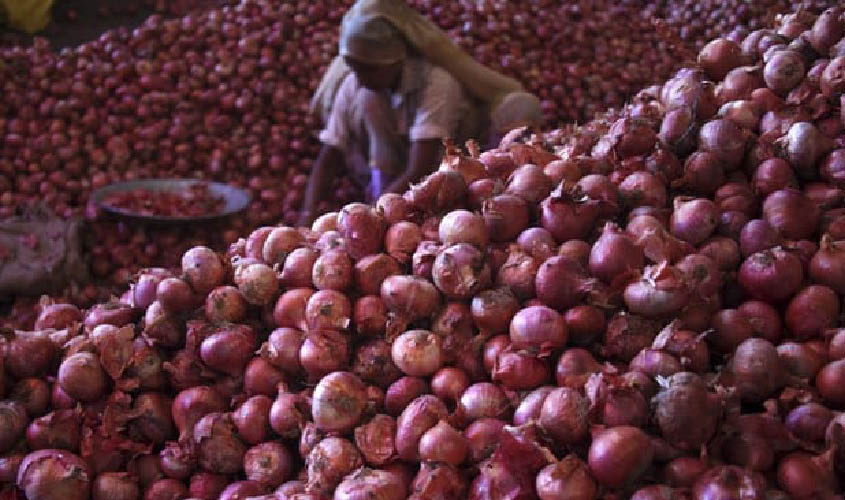With onion prices touching Rs 100 per kg in the national capital, political parties are trying hard to capitalise on it as they had earlier faced the repercussions of high prices.
NEW DELHI: Whenever there has been a rise in prices of the “politically sensitive” onion, it has cost politicians dear, even to the extent of reshaping the political destiny of several governments. This time, too, with onion prices touching Rs 100 per kg in the national capital, political parties are trying hard to capitalise on it as they had earlier faced the repercussions of its high prices.
Last week, Delhi Congress president Subhash Chopra, while blaming the AAP government of joining hands with hoarders, said that people had dethroned the BJP government in 1998 on the issue of rising onion prices. Chopra said this while wearing onion garlands during a protest in front of the Delhi Secretariat. He appealed to the people of Delhi to vote out the AAP government which has “failed to control onion prices and such other essential commodities”.
In 1998, then Delhi Chief Minister Sushma Swaraj had to face the fury of soaring onion prices which resulted in a big loss for the BJP in the Assembly polls. Capitalising on it, Sheila Dikshit came to power in Delhi in 1998. However, just before the 2013 Assembly elections, onion prices in Delhi surged again and the “political” onion struck the Dikshit government. Then, too, the BJP and AAP capitalised on high onion prices by selling them at a cheaper rate at their outlets. They succeeded and the Congress lost Delhi after 15 years of its rule.
Falling in the same trap, the AAP government has attributed the present price rise to an unpredictable drop in supply owing to weather conditions in large parts of Maharashtra, the biggest source of onions for Delhi-NCR. Apart from flagging off 70 vans and identifying 400 fair price shops for distribution of onions at a subsidised rate, Delhi Chief Minister Arvind Kejriwal last week said that he had also written to the Centre, asking for subsidised onions for Delhi.
However, the BJP smelt a rat behind the sudden surge of onion prices and urged the Delhi Lieutenant-Governor to initiate an inquiry into what they feel is an “onion-scam”. BJP MLA and leader of Opposition Vijender Gupta slammed AAP for turning a deaf ear when the Centre repeatedly requested it to buy onions at Rs 15.90 per kg out of its buffer stock to make the vegetable available in Delhi during the lean period.
Meanwhile, the Central government, too, in a bid to curb the rising prices, has announced that it will import 100,000 tonnes of onions from Dubai and other countries.
Whenever onion finds a place in Indian politics instead of the kitchen, it leaves buyers teary-eyed. Dilip Das, a pakoda seller in South Delhi’s Munirka village, told this reporter how his sale of pyaaz pakoda has systematically declined in the last few months. “I used to buy 4-5 kg onion daily and it would get sold within a few hours. In the present situation, I cannot afford to buy 4-5 kg a day. Even the customers are unwilling to pay more for pyaaz pakoda. As there is no profit in making small quantities of pakoda, I have stopped buying onions. I will start making once the prices fall,” Das said.
Meanwhile, the subsidised onion available in identified fair price shops last for a few hours as they receive a limited quantity for the subsidised distribution. Mukta Rana, a buyer at a fair price shop at DDA market near RK Puram, told The Sunday Guardian: “To buy subsidised onion, you have to stand in queue from early morning. The shops open at 6 am and the whole stock finishes by 7 am or 8 am.”
The fair price shops are selling onion at Rs 23.90 per kg in Delhi and as per the government orders, an individual is entitled to only 2 kg. Despite this, most of the fair price shops are running out of its daily stock within a few hours. Talking about the shortage, owner of a fair price shop told this newspaper: “Though the blame was given to rain and other natural causes, it is the traders who have hoarded the onion, anticipating the market situation and are releasing it slowly in the market.”
Despite India being one of the top four exporters of onion, the plight of the producers is much worse as most of them had to sell their produce at a mere Rs 7-8 per kg. The situation of onion growers in Maharashtra became viral in a recent video where a farmer was seen crying over the rock-bottom price he got for his onion crop. The farmer, from Ahmednagar, had to sell his crop at Rs 8 per kg.
Earlier, an onion farmer from Maharashtra had protested by sending Rs 6—his earning—to then Maharashtra Chief Minister Devendra Fadnavis.
Dr Ajay Nawle, a Vidarbha-based leader of Maharashtra’s Kishan Sabha, told The Sunday Guardian: “The issue of Maharashtra’s onion shortage is not about imbalance between demand and supply. There is enough production of onion to meet the growing demand in our country. The main problem is with the supply chain as the traders play all their tricks to gain more profit. This results in farmers and customers suffering the most.”
He also added that to end the suffering of farmers, the Kishan Sabha in Maharashtra has been demanding that the government set up a credit mechanism like loans against their onion stock in storage.

